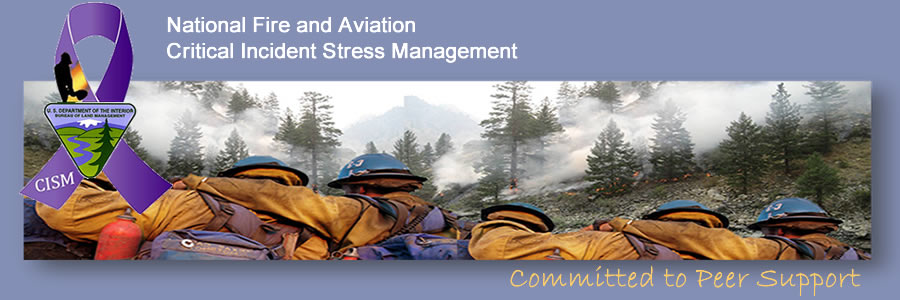Main Print Heading
Print Subheading
Under Construction
Critical Incident Peer Support
Peer relationships are built around a mutual understanding, respect and trust. Shared experiences, particularly those which have happened during wildland fire operations, bind individuals together. They are the foundation for peer support as they foster the initial trust and credibility necessary for developing relationships in which individuals are willing to open up and discuss their problems despite concerns about stigma. Peer-to-peer programs facilitate opportunities for individuals to talk with trained peer supporters who can offer educational and social support and provided avenues for additional help if needed.

Experts believe that various techniques and processes used in Critical Incident Peer Support can help individuals improve their coping abilities and dramatically decrease the occurrence of Post -Traumatic Stress Disorder (PTSD), lower the tension and mitigate the group’s reaction to a traumatic event. Wildland fire and aviation personnel suffering from such symptoms have shown to benefit significantly from Critical Incident Stress Management (CISM). Read More
What We Do
The Interagency Critical Incident Peer Support Program provides a number of services that include situational assessment for Agency Administrators, Managers, and others to help determine the appropriate response. Each process is put in place based on a methodical approach. Tactics are applied at the right time, in the right place and under the right circumstances. We provide leadership able to organize chaos into ultimate order.

We provide a licensed Mental Health Care Professional (Clinician) who is experienced in trauma and meets our screening and experience criteria. We provide Peer Supporters who can travel to the fire line, spike camp and other remote locations. Read More
Training and Credentialing Standards
Training is a critical aspect of ensuring consistency and confidence in peer supporters. Specific training needs have been developed in association with the defined roles of each Critical Incident Peer Support Group member .Critical Incident Peer Support Groups as well as Critical Incident Stress Management Coordinators (CISM Coordinators) providing crisis intervention services for BLM personnel will be trained and credentialed by the International Critical Incident Stress Foundations (ICISF) and follow BLM requirements for certification and formal ethics, conduct, and confidentiality policy.

The ICISF model is accepted as the most effective standard of care for organizations with cultures having a history of mistrust in outside sources for crisis intervention and support. It is also the model formally adopted by the Bureau of Land Management. Read More
Recruiting and Screening Peer Supporters
It is rucial that oversight of a CISM program is continuous and that peer supporters are carefully screened and trained properly. Individuals interested in serving as Peer Supporters, and Peer Support Group Leaders may apply through their Geographic Area Critical Incident Stress Management Coordinators is established. They may also apply directly through the BLM National CISM Coordinator, regardless of agency. The selection process begins with completion and submission of an application form, which must be signed by the applicants supervisor along with a Code of Ethics statement.
The selection process may include a review of applicants’ interests and motivations for being peer supporters, such as their previous education and training, as well as personal exposure to traumatic experiences and the responses to those experiences. There are desirable personal qualities such as maturity, good judgment, empathy, teamwork, and personal and professional credibility that should be evaluated through the selection process. It can be useful to provide applicants with scenarios to gauge applicants’ empathy, interpersonal skills, and judgment. Read More

Critical Incident Peer Support Groups
The BLM does not maintain “CISM Teams.” CIPS Groups are assembled at the time of request and will be comprised of trained and credentialed CIPS personnel selected to match the backgrounds and experience of those involved in the critical incident (helitack, engines, dispatchers, smokejumpers, etc). The BLM Peer Support Program selects only the best and most qualified for each assignment, including trainees. Those selected must be credible, experienced in fire and aviation, trusted and held in high esteem. They must be senstive to diversity and multi-cultural components within the agencies. Read More

Who is a Peer?
A Critical Incident Peer Support (CIPS) Group member is a highly respected and trusted person from any of the different organizations or specific functions within the national fire program. Peer support involves persons that have been trained in the principles of peer support, endorses specified ethical standards, functions under clinical supervision, and are members of a CIPS Group.The best peers are individuals who share the same backgrounds; i.e., engine personnel to engine personnel. A peer to a firefighter on a hotshot or veterans crew for example, would have substantial (and preferably current) experience on the fireline and within the hotshot/veterans crew community. . Read More
Limitations to Peer Support
The use of peer supporters is not a substitute for the services of mental health professionals. It must be established and understood that peer supporters augment the services of clinician but do no replace them. Not everyone is suited for the role. Some individuals may be unwilling to talk with peers because they question their credibility/validity, may know them well or professionally they are too closely associate, want to be counseled by a professional, or because they are concerned about lack of confidentiality. Read More
Links and Other Information
- Peer Supporter Roles
- Peer Support Group Roles
- Sample Link
- Defense Center of Excellence: Best Practices for Peer Support Programs
Vestibulum erat wisi condimentum sed commodo vitae ornare sit amet wisi. A

Social Media Connect